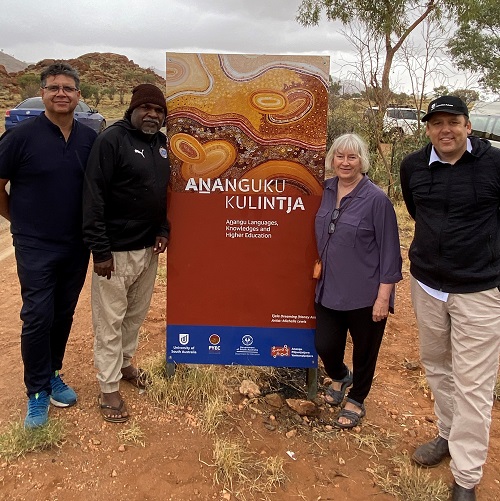22 May 2024

From left: Professor Lester-Irabinna Rigney, PYEC Director Rueben Burton, Professor Anne-Marie Morgan and Dr Sam Osborne at UniSA's Ananguku Kulintja hub in the APY Lands, for the launch of the app and song book at the Kulilaya Festival
A new app and song book are reinforcing cultural identity and first language literacy for children in Anangu schools across the tristate region (SA, NT and WA), while promoting all the social and learning benefits that come with singing.
Singing has long been a favourite classroom activity for children, with song books bringing back fond memories for many Australian adults. Together with helping to develop memory, emotional control and social skills, singing helps with cognitive development across areas such as numeracy, sequencing and attention.
Singing is also proven to be a vital part of literacy, weaving the embedded aspects of reading, repetition, memory work, pronunciation and meaning making. The affective components of singing - through awakening positive emotional responses and provoking reflection on important social, cultural, environmental and global issues - form an irresistible package.
Now researchers at the University of South Australia have partnered with the Anangu Iwiri Aboriginal Corporation, the South Australia Department for Education, the Anangu Communities Foundation, and Arts SA to create the Inkamala! (Let’s Sing) early years song book and corresponding Iwiri app.
UniSA Associate Director of Regional Engagement, Dr Sam Osborne, says developing the app and song book was a two-year project. The early years song book includes more than 60 songs, displayed in a colourful publication alongside cheerful pictures by Aboriginal illustrators designed to appeal to children.
A second song book of around 60 songs for older students and communities is currently in production.
“The songs chosen represent extensive research and collaboration between Yarnangu/ Anangu, and Piranpa (non-Aboriginal) educators,” Dr Osborne says.
“Some were generated from old publications, recordings, and handwritten notes, however, much has been retrieved from memory work of Anangu community members. Many songs feature educational concepts, many are simply fun, with lyrics in Ngaanyatjarra, Pitjantjatjara, and Yankunytjatjara language.”
Dr Osborne says the production and use of high quality first language resources are vital for Aboriginal children where English is essentially a second language.
“Learning through our first language is most important in the early years, where children are embedding concepts of time, space, numbers and so on. Singing in our first language also helps to strengthen cultural identity and belonging in the classroom space, as well as the broader work of strengthening first languages and cultures.
“The song book is designed to be used with the app, where songs can be downloaded and variations of harmonies and backing tracks isolated – effectively enabling teachers and community members to become choir teachers.”
The app also provides English back-translations in addition to the first language lyrics, and background information on the origin of each of the songs.
The app and song book were distributed ahead of the recent Kulilaya Festival that celebrated land rights in the APY Lands. The 40th anniversary event featured a performance by a community choir of children and adults, who had rehearsed from the song book and app in their separate communities before joining the Iwiri choir for the first time on stage.
The launch of the book and app coincide with UniSA’s celebration of 40 years in the APY Lands through its APY hub, re-named this year: Ananguku Kulintja: Anangu Languages and Knowledges in Higher Education. The centre collaborates with Anangu communities and organisations to conduct research, develop high quality first language resources, and deliver language and culture courses, including online and in-person programs across South Australia and the Northern Territory.
Dr Osborne has worked in Aboriginal Education since 1995, including as principal of the Ernabella Anangu School in the remote northwest of South Australia, just south of the Northern Territory border. He reestablished the Ernabella School choir together with Mr Gordon Ingkatji in 2006. Since then, he has worked with Anangu/Yarnangu choral singers in Alice Springs (2009-2015), across the APY Lands (including WoMAdelaide, 2016), and with the Iwiri choir based in Adelaide since 2017.
Media contacts:
Megan Andrews M: +61 434 819 275 E: megan.andrews@unisa.edu.au
Sam Osborne E: Samuel.Osborne@unisa.edu.au



